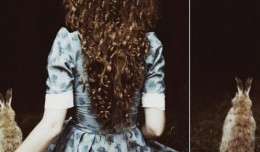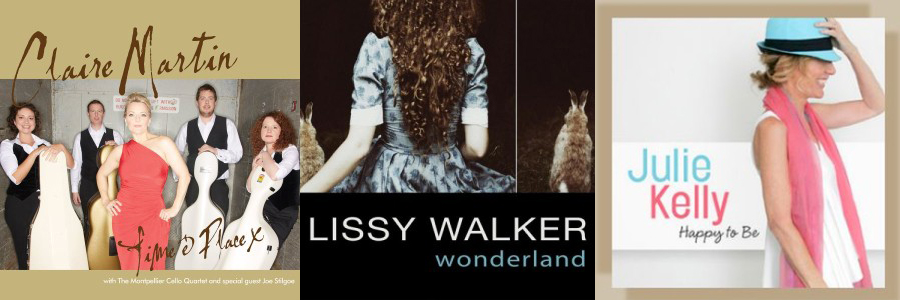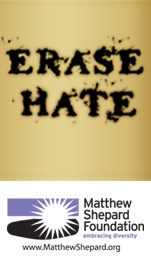TIME & PLACE
Claire Martin & The Montpellier Cello Quartet
Linn Record
WONDERLAND
Lissy Walker
Dogwood Records
HAPPY TO BE
Julie Kelly
Jazzed Media
The Great American Songbook is only gaining more luster as time goes by and contemporary successors to the likes of Rodgers and Hart, Gershwin, Porter, Ellington and Razaf, Mercer, et al. prove elusive. Recently, three gifted vocalists have all taken runs at the Songbook, but at the same time each one is suggesting new songwriter candidates be considered as worthy of being mentioned in the same breath with the aforementioned standard bearers of Songbook excellence. The Bay Area’s Lissy Walker is the most traditional—and most gifted–of these vocalists, championing deep emotional involvement in the lyrics and her sensual attack, whereas Julie Kelly comes out of the Annie Ross tradition of rhythmically oriented vocalizing (she even dips into vocalese at times) in which her conversational voice is truly an instrument and Claire Martin offers a classically flavored, altogether captivating blend of Ms. Walker’s and Ms. Kelly’s approaches in her ambitious pairing with the Montpellier Cello Quartet.
Some three years have passed since Lissy Walker made her dazzling debut with Life is Sweet (subject of a highly favorable review in TheBluegrassSpecial.com) but in the interregnum she seems to have grown bolder as a singer. On Wonderland her singing has a sense of freedom about it that strikes your faithful friend and narrator as being indicative of a new confidence—not necessarily in her technical skills as a jazz singer but in letting passion rule the day because the technique will be there, doesn’t have to be thought about. You’ll hear it right off the bat, in her medley of those lovely old warhorses, “Dream a Little Dream of Me/I’ll See You in My Dreams.” Is it necessary to point out how dreamy the track is, given the songs? But that’s part of the allure: an opening swirl of melody centered on John R. Burr’s piano and Ben Goldberg’s clarinet supporting a deliberate vocal segues seamlessly into a soft jazz shuffle with Ms. Walker purring a low-key come-on and being shadowed by Steven Bernstein’s warm trumpet and Goldberg’s clarinet. Similarly, her treatment of “Tonight You Belong to Me,” the 1926 evergreen written by Billy Rose and Lee David, is all sultriness and sweetness with a country flavor in an easy swinging arrangement featuring Scott Nygaard’s mandolin and Burr’s discretely rumbling B3. (“Tonight You Belong To Me” has not been treated well in the wake of Patience & Prudence’s 1956 hit version, with special indignities visited on it by The Bird and The Bee; Zooey Deschanel and Ben Schwartz; and, worst of all, Eddie Vedder and the talent-free Cat Power on Vedder’s useless 2011 solo album, Ukulele Songs, but Lissy Walker’s version corrects all those musical homicides.) She works similar wonders on Rodgers and Hart’s “Isn’t It Romantic?” Hers is for the super-romantic, with the tender affection in her voice augmented by Scott Nygaard’s nylon-string guitar, Burr’s spare piano fills and a soothing, ever-ascendant string section ladling on an extra patina of sigh inducing beauty.
SELECTED TRACK: ‘Isn’t It Romantic?’ (Rodgers and Hart), Lissy Walker, from Wonderland
SELECTED TRACK: ‘I’ll Be Home’ (Randy Newman), Lissy Walker, from Wonderland
But to these and a couple of other venerable standards Ms. Walker also assays J.D. Souther (in a wounded country ballad version of “Faithless Love”); Richard Thompson (a tense, somber treatment of the remorseful “I Wish I Was a Fool For You” leaning heavily on the steady pulse of Jason Lewis’s brush drums and the bluesy testifying of Burr’s piano); Randy Newman (an earnest, sensitive reading of one of his loveliest and most heartfelt ballads, “I’ll Be Home,” in an arrangement fleshed out a discrete string trio, the quiet cry of Jon Evans’s lap steel and, again, Burr’s evocative piano). Even Harry Nilsson gets the Lissy Walker treatment in the lush, wistful ballad “Remember,” with the singer fully invested in the song’s upbeat aphorisms (“think of all that life can be”), delivering these in a voice as sturdy as it is warm and engaging, with the slightest of country lilts evident as the arrangement grows curiously moody when the string trio and Bernstein’s trumpet mesh in a jazzy eddy that is virtually a counter-voice to Ms. Walker’s optimism. And there’s the rub: Wonderland’s romantic moments are about equally offset by intimations, if not overt statements, of heartbreak, making of this album a conceptual exploration of the yin and yang of relationships, which are, after all, as Woody Allen says at the end of Annie Hall, “totally irrational and crazy and absurd.” A joke is attached to Woody’s observation, but on Wonderland Lissy Walker is content to forego musing about what we keep diving into relationships and simply underscore the way the earth seems always to quake under the feet of couples trying to get along. Clearly there is more to come.
Not that Lissy Walker has a corner on the sultry siren market. On Peace of Mind, with the backing of the Montpellier Cello Quartet (as well as piano, bass and drums), Claire Martin, the First Lady of U.K. Jazz, often sounds like the reincarnation of latter-day Rosemary Clooney, who brought the full weight of her life’s experiences—especially in romance—to bear on her repertoire (which includes a moving, emotional reading of Ira Gershwin-Kurt Weill’s heavily metaphoric personal mission statement “My Ship” as its kickoff tune), adding new layers of meaning to songs more than a half-century old. Lennon-McCartney’s “She’s Leaving Home,” now 47 years of age, is given a scintillating new coat of paint in a moody arrangement by pianist Joe Stilgoe, from which emerges a deliberate vocal reading that heightens the lyrics’ evocation of a daughter’s tragic alienation from her selfish, clueless parents, as the piano adds a bluesy underpinning to Ms. Martin’s wounded vocal. A clever reshaping occurs in David Bowie’s “The Man Who Sold the World.” Here, the rock elements of the original are discarded in favor of dark, “Eleanor Rigby”-like strings and a pronounced Latin underpinning, producing tension between the lively samba and the heralding strings, all supporting Ms. Martin’s clarion vocal (Stilgoe has a terrific romping piano solo near the end as well), guaranteed to inspire a fresh perspective on this intriguing entry from the Thin White Duke. On an album with so many moods, one of the most revealing occurs on Joni Mitchell’s “Two Grey Rooms.” In this arrangement by composer Mark Anthony Turnage (commissioned by Ms. Martin), the mood hews closely to the despair in Ms. Mitchell’s original, but with the Cello Quartet’s swirl of deep moans in the background Ms. Martin’s tone of restrained disgust at the folly of her obsession with a lost lover is the start of a healing process, in sharp contrast to the original’s entrenched misery. On a lighter note, Richard Rodney Bennett, a long-time collaborator with Ms. Martin, contributes “Early to Bed,” a lighthearted swinger with a freewheeling vocal and brisk arrangement fueled by sparkling piano runs (either by Stilgoe or Gareth Williams) and upbeat acoustic bass fills courtesy Jeremy Brown. Ms. Martin chooses another Bennett tune, the reflective piano-based ballad “Goodbye for Now” (a co-write with Charles Hart), as her sign-off here, singing warmly over the sensitive 88s, “To those of you I leave behind/I hope and pray that you may find/some pleasure and some peace of mind/in all that follows me…” It’s actually a last will and testament, the lyrics expressing the singer’s wish for the distribution of her personal effects, both physical and metaphysical, but in this context it’s akin to a review of the emotional landscape she’s traversed on Time & Place. Ultimately she arrives at something approximating the album title, and it does indeed seem like she’s shaken off a great burden, albeit one she has borne with dignity and grace over the course of the preceding 10 tunes. Ms. Martin’s many admirers will not be surprised by the impact she makes with her cool approach, and newcomers to her art will find a reason to believe.
Julie Kelly, ‘Happy to Be,’ the title song of her new album, by songwriter Bob Dorrough with solos by Bill Cunliffe (piano) and Anthony Wilson (guitar)
“Vocalese unbounded” is a phrase jumping out of the lively swing of Bill Peterson-Inga Swearingen’s “Happy to Be,” the title track of West Coast jazz singer Julie Kelly’s new album. Sure enough, Ms. Kelly, whose voice is not as earthy as Lissy Walker’s or as evocative as Julie Martin’s, demonstrates a breezy, fluid sense of phrasing as deploys her cornet-like voice in give-and-take segments with the brass and reeds around her. She has the advantage here of being produced by Bill Cunliffe, who doubles on piano and synthesizer, and being backed by stalwarts such as guitarist Anthony Wilson, drummer Joe LaBarbera, Bob McChesney on trombone, Clay Jenkins on trumpet, Nick Mancini on vibes, and other top-drawer players. Ms. Kelly rides easily and gracefully over her group’s languid beauty in Dave Frishberg’s “Our Love Rolls On”; convincingly inhabits the psyche of a woman fretting her resistance to the charms of another in Bob Dorough’s spirited workout, “You’re the Dangerous Type.” Like Claire Martin, Ms. Kelly is a fan of Richard Rodney Bennett, whose dreamy love ballad “I Never Went Away,” inspires Ms. Kelly’s most sensitive, revealing reading on the album, as her confessions of abiding love are enhanced by a sensuous and sensual trumpet solo courtesy Clay Jenkins. By contrast, she sounds both ashamed and wearily worldly wise in reflecting on the well-worn games lovers play (“I know the smile, the look/I know the book/what’s more I’ve even read between the lines…”) in a spare, haunting piano ballad “I Have the Feeling I’ve Been Here Before,” a co-write between Roger Kellaway and the titanic team of Marilyn & Alan Bergman that advances startling, Sondheim-like insights into the wounded souls of mature lovers—insights all the more searing for the way Ms. Kelly seems as detached from the emotional tumult as she has been burned by it, as Bill Cunliffe fashions heart tugging, minimal blues stylings behind her. Add in such tasty items as an angular run at Jobim’s “Corcovado” (with affecting atmospheric touches provided by Bob Sheppard on flute and Anthony Wilson on guitar) and a bopping, buoyant take on Thad Jones’s “High in the Sky” with perky horns, frisky percussion, a stuttering trombone solo via Bob McChesney and Ms. Kelly adding thrust with her vocalese turn, and, well, you have an altogether memorable outing from a vocalist expert at getting under your skin, and, once there, knowing how to make her presence felt for the long haul.






















